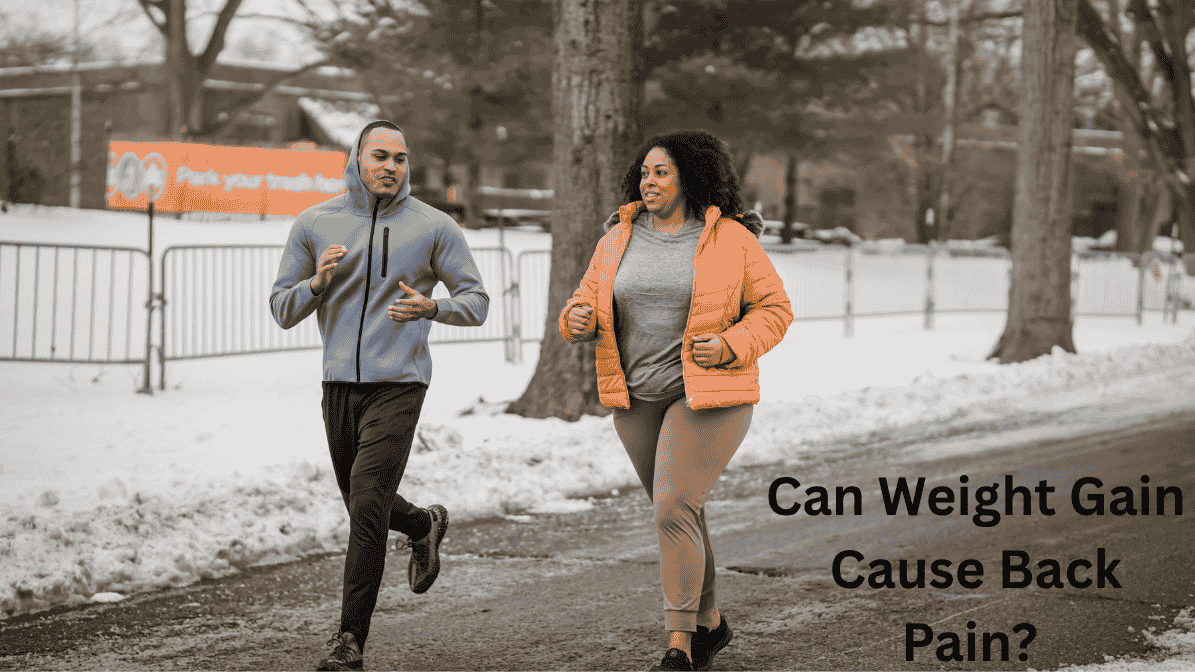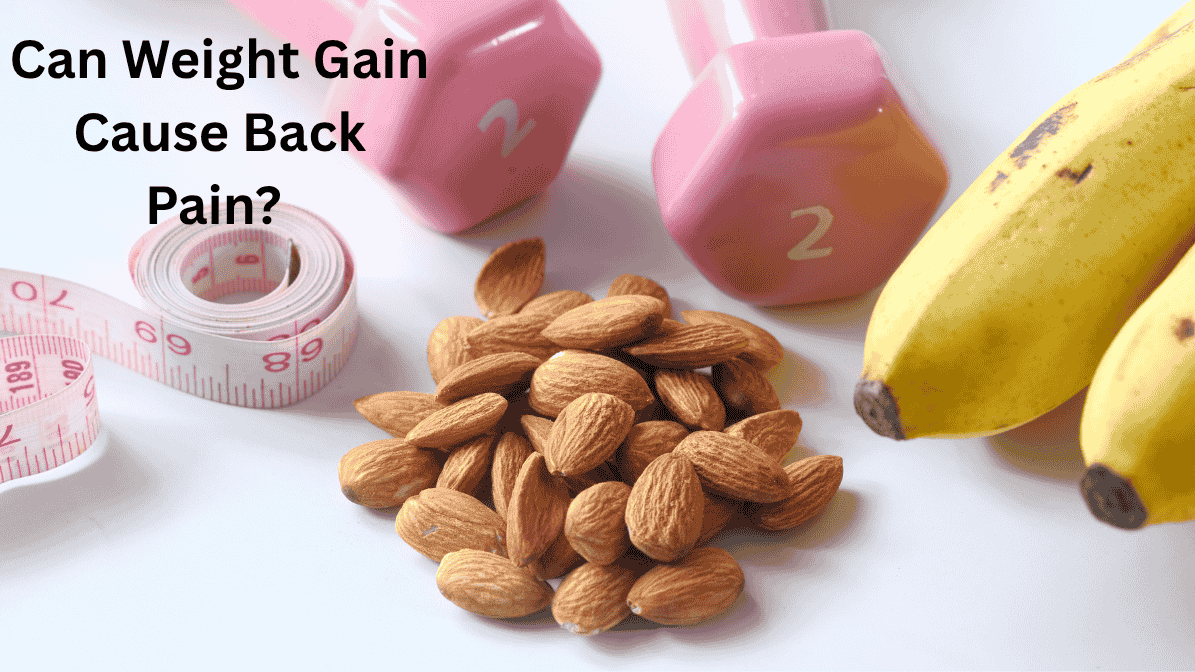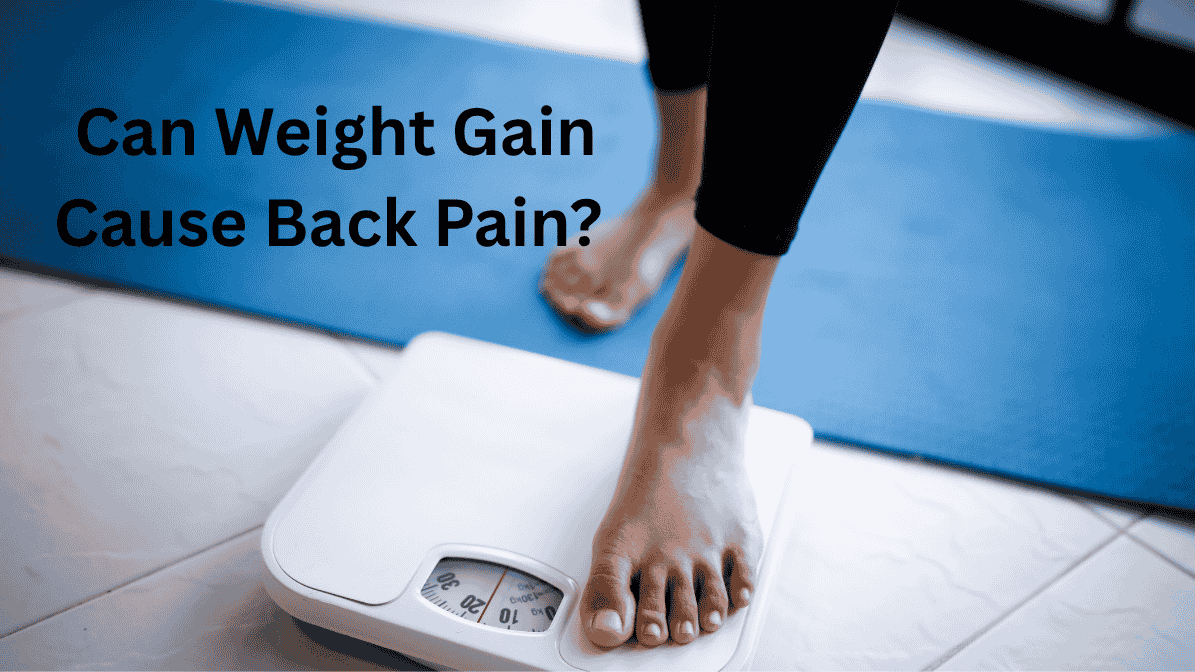introduction
Back pain is one of the most common health complaints in the United States, affecting millions of people each year. If you’ve ever wondered, “Can weight gain cause back pain?” you’re not alone. Many Americans struggle with both weight management and back discomfort, but the connection between the two isn’t always clear.
In this article, we’ll break down the science, explain why weight gain can lead to back pain, and offer practical tips for prevention and relief—all in simple, easy-to-understand language.
Table of Contents

What Is Back Pain?
Back pain is discomfort or soreness felt anywhere along the spine, from the neck down to the lower back. It can range from a mild ache to severe, disabling pain. Back pain can be short-term (acute) or last for months or years (chronic). Most adults will experience back pain at some point in their lives.
Common causes of back pain include:
- Muscle or ligament strain
- Bulging or ruptured disks
- Arthritis
- Poor posture
- Injuries from lifting or accidents
Back pain is especially common in the lower back, which supports much of your body’s weight and movement3.
How Common Is Back Pain in the United States?
Back pain is a leading reason for doctor visits and absenteeism from work. About 2 in 5 American adults are affected by obesity, and many of them also report frequent back pain. Studies show that people who are overweight or obese are more likely to experience back pain than those at a healthy weight.
How Does Weight Gain Affect the Spine?
Your spine is designed to support your body’s weight and help you move. When you gain weight, especially in your belly, it puts extra pressure on your spine and the muscles that support it. Here’s how it happens:
- Increased Load: Every extra pound you carry adds about four pounds of pressure on your spine5. This extra load can strain the muscles, ligaments, and disks in your back.
- Posture Changes: Carrying extra weight, especially around your middle, can tilt your pelvis forward and increase the curve in your lower back. This can lead to poor posture and more stress on your spine3.
- Disk Compression: The disks between your vertebrae act as cushions. Extra weight compresses these disks, making them more likely to bulge or herniate, causing pain32.
- Inflammation: Fat cells release chemicals that can cause inflammation throughout your body, including your back. This inflammation can make pain worse and contribute to conditions like arthritis67.
Scientific Evidence Linking Weight Gain and Back Pain
Research consistently shows a strong link between weight gain and back pain:
- A large review found that people who are overweight or obese have a higher risk of developing low back pain. The risk goes up as weight increases.
- Studies show that even a 5% increase in body weight can raise your risk of back pain significantly8.
- Obesity is linked not only to more frequent back pain but also to more severe and chronic cases116.
- The risk is especially high for adults over 50, but younger people can be affected too61.
Why Does Weight Gain Cause Back Pain?
1. Extra Pressure on the Spine and Joints
Every pound of extra weight puts additional stress on your spine and joints. Over time, this can lead to wear and tear, injuries, and chronic pain52.

2. Changes in Posture and Spinal Alignment
Carrying excess weight, especially in the abdomen, can shift your center of gravity and change the natural curve of your spine. This can lead to spinal misalignment and muscle strain31.
3. Increased Inflammation
Fat tissue releases chemicals called cytokines that cause inflammation. Chronic inflammation can make back pain worse and contribute to conditions like osteoarthritis and disk degeneration617.
Types of Back Pain Related to Weight Gain
Lower Back Pain:
This is the most common type of back pain linked to weight gain. The lower back (lumbar region) supports most of your body’s weight, making it especially vulnerable34.
Sciatica:
Extra weight can put pressure on the sciatic nerve, causing pain that radiates down your leg3.
Disk Degeneration and Herniated Disks:
The added load from weight gain can speed up the breakdown of spinal disks, leading to chronic pain and nerve problems23.
Osteoarthritis:
Obesity increases your risk of developing osteoarthritis in the spine, which causes pain, stiffness, and reduced mobility6.
How Much Weight Gain Increases Your Risk?
Even small weight gains can have a big impact on your back. For every pound you gain, your spine feels up to four extra pounds of pressure. That means gaining just 10 pounds can add 40 pounds of pressure to your lower back!
Research shows:
- A 5% increase in body weight can raise your risk of back pain by about 11%8.
- The risk and severity of back pain go up as your body mass index (BMI) increases47.
- People with higher waist circumference (belly fat) are especially at risk7.

Prevention: How to Avoid Back Pain When Gaining Weight
1. Maintain a Healthy Weight
The best way to protect your back is to keep your weight in a healthy range. Eat a balanced diet, watch portion sizes, and stay active.
2. Build Muscle Strength
Strong muscles, especially in your core and back, help support your spine. Include exercises like walking, swimming, yoga, or strength training.
3. Practice Good Posture
Stand and sit up straight, keep your shoulders back, and avoid slouching. Use ergonomic chairs and supportive mattresses.
4. Lift Properly
When lifting heavy objects, bend your knees and keep your back straight. Avoid twisting or jerking motions.
5. Stay Active
Regular movement helps keep your back flexible and strong. Try to avoid sitting for long periods.
Relief: What to Do If You Have Back Pain
At-Home Remedies:
- Rest, but not for too long—gentle movement is important.
- Use ice or heat packs to reduce pain and inflammation.
- Over-the-counter pain relievers may help.
When to See a Doctor:
- If your pain lasts more than a few weeks
- If you have numbness, tingling, or weakness in your legs
- If you have trouble controlling your bladder or bowels
Medical Treatments:
- Physical therapy
- Prescription medications
- Injections or other procedures in severe cases
The Benefits of Losing Weight for Back Health
Losing weight can significantly reduce your risk of back pain. Studies show that weight loss can improve back pain symptoms and prevent future problems.

Safe Ways to Lose Weight If You Have Back Pain:
- Focus on low-impact exercises like walking, swimming, or cycling.
- Work with a physical therapist to design a safe exercise plan.
- Make gradual changes to your diet and activity level.
Frequently Asked Questions
Can weight gain cause back pain in children or teens?
While most studies focus on adults, children and teens who are overweight can also develop back pain. The risk increases as they get older and gain more weight.
Does where you gain weight matter?
Yes. Gaining weight around your belly (central obesity) is more likely to cause back pain than gaining weight in your hips or thighs7.
Is all back pain from weight gain reversible?
Not always, but losing weight and improving your fitness can help reduce pain and prevent further damage18.
Conclusion
So, can weight gain cause back pain? The answer is yes. Carrying extra pounds puts stress on your spine, changes your posture, and increases inflammation—all of which can lead to back pain.
The good news is that by maintaining a healthy weight, staying active, and practicing good habits, you can protect your back and reduce your risk of pain.
If you’re already experiencing back pain, talk to your doctor about safe ways to manage your weight and improve your back health.
Remember: Even small changes can make a big difference for your back—and your overall well-being.



